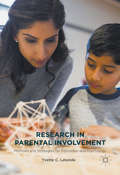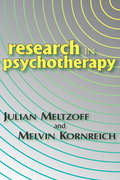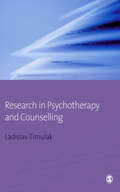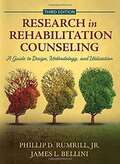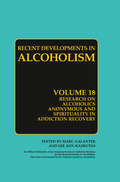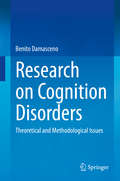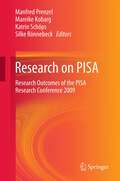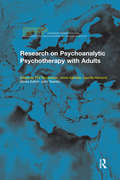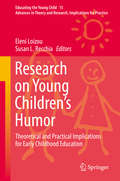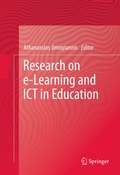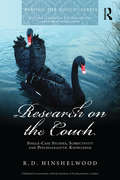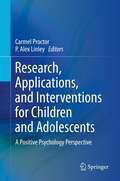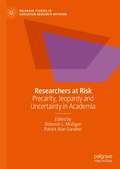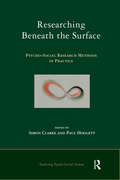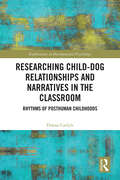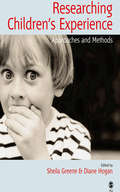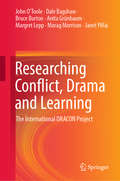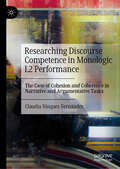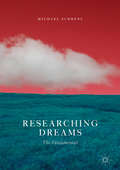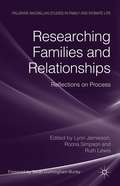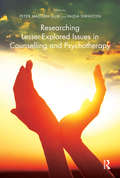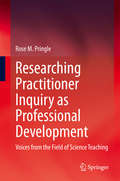- Table View
- List View
Research in Parental Involvement
by Yvette C. LatundeThis book examines the process of conducting research on parental involvement in an effort to promote academic achievement across all school levels, income levels, and racial lines, theories, and research. Latunde explores the policies that have emerged to support the role of families and home-school collaboration in the education of youth, and evidence supporting home school collaboration and the need for parental involvement to improve student outcomes. She defines parental research and its role in our understanding of parental involvement and student outcomes and examines federal and state mandates for parental involvement and shares specific parental involvement resources. The nuances in parental involvement are critical to understanding the roles family play in the academic achievement youth, and how schools may partner with parents for success.
Research in Psychotherapy
by Robin FoxResearch in Psychotherapy is a comprehensive synthesis and assessment of the psychotherapeutic research literature for the use of both researchers and those in clinical practice. It is designed as a general reference work, an instruction guide, and a source of information about specific aspects and problems of research.The book consists of three parts. Part 1 discusses principles and methods of research as they are applied to psychotherapy. It provides general background material and principles to help non-researchers appreciate some of the important problems that are encountered. In Part 2, existing research on the effects of psychotherapy and the determinants and correlates of outcome are clustered and reviewed. Chapters 4 to 7 are concerned strictly with a review and appraisal of controlled studies that were designed to evaluate the effects of psychotherapy. Chapters 8 to 13 deal with a large body of research on various factors associated with therapeutic outcome--method, style, and technique variables; patient, therapist, and time variables. Part 3 is concerned with research on aspects of the therapeutic process and on the effect of many of these same variables on the therapeutic interchange as distinct from the outcome of therapy. Also discussed is research on various therapeutic phenomena and conditions about which so much has been written and so little really known.Research in Psychotherapy was written in the conviction that clinical practice should be influenced by research and that rigorous research that meets acceptable experimental standards can be done on the field of psychotherapy.
Research in Psychotherapy and Counselling
by Ladislav Timulak"Timulak's aims, to clarify research and its value for practice, and to alert people to its 'limitations and potential misuse', have certainly been achieved. This book deserves a place in every professional library and I recommend it to anyone who is interested in understanding more about research" - Therapy Today, May 2009 'An authoritative text, providing a first-rate outline of the specific methods that counselling and psychotherapy researchers use, and illustrated through a wealth of examples' - Professor Mick Cooper, Senior Lecturer in Counselling, University of Strathclyde 'The content is comprehensive and covers the full range of knowledge and information that a trainee psychologist/psychotherapy researcher would want to have... It offers a general overview of psychotherapy research methods and their logic which is not duplicated in any book that I know of' - Georgia Lepper, Senior Lecturer in Psychotherapy, University of Kent Research in Psychotherapy and Counselling is a guide to methods used in studying the outcomes and processes of therapy. Introducing a range of methodologies which are used internationally, the author describes different research designs and illustrates them through examples of actual studies. Presenting the findings from key studies, he clearly demonstrates the usefulness of the research in therapeutic practice. Research in Psychotherapy and Counselling is ideal for researchers and for students on courses in counselling, psychotherapy, clinical and counselling psychology and psychiatry. Ladislav Timulak is course director of the MSc in Counselling Psychology at Trinity College, Dublin. He previously worked at the University of Trnava, Slovakia, and has extensive practical experience in the field of counselling and psychotherapy, as well as experience in conducting psychotherapy training.
Research in Rehabilitation Counseling: A Guide to Design, Methodology, and Utilization
by James L. Bellini Phillip D. RumrillThis book provides the basics that one would need to begin conducting a research investigation. It was written as a primary text for graduate level students and practitioners concerning the role of research in contemporary rehabilitation counseling. It is the authors intent to provide a comprehensive overview of the philosophical, ethical, methodological, and analytic fundamentals of social science research, as well as to specify aspects of rehabilitation research that distinguish it from scientific inquiry in other helping professions. It has been thoroughly revised to accurately reflect the variation and wealth of research methodologies used in contemporary rehabilitation counseling research more than 300 new references have been added. Most of the research examples cited were published in peerreviewed rehabilitation counseling journals over the past decade, and these examples represent the current status of research methods as well as the most relevant contemporary topic areas of research and scholarship in the field. Accordingly, it may be used both as a research textbook and as a general introduction to the current scholarship. Because this book was written as an introductory research methods textbook for graduate students in rehabilitation counseling, the authors focus much of the information contained herein on the role of readers as professional consumers of rehabilitation research. It will prove to be an invaluable resource for counselors, administrators, policymakers, educators, researchers, people with disabilities, and consumer advocates.
Research on Alcoholics Anonymous and Spirituality in Addiction Recovery
by Marc Galanter Lee Anne KaskutasIt was once taken for granted that peer-assisted groups such as Alcoholics Anonymous had no "real" value in recovery from addiction. More recently, evidence-based medicine is recognizing a spiritual component in healing--especially when it comes to addiction. The newest edition of Recent Developments in Alcoholism reflects this change by focusing on the 12-step model of recovery as well as mindfulness meditation and other spiritually oriented activity. More than thirty contributors bring together historical background, research findings, and clinical wisdom to analyze the compatibility of professional treatment and nonprofessional support, day-to-day concepts of relapse prevention, the value of community building in recovery, and much more. Among the topics covered: (1) How and why 12-step groups work. (2) The impact of the spiritual on mainstream treatment. (3) The impact of AA on other nonprofessional recovery programs. (4) AA outcomes for special populations. (5) Facilitating involvement in 12-step programs. (6) Methods for measuring religiousness and spirituality in alcohol research. Whether one is referring clients to 12-step programs or seeking to better understand the process, this is a unique resource for clinicians and social workers. Developmental psychologists, too, will find Volume 18--Research on Alcoholics Anonymous and Spirituality in Addiction Recovery a worthy successor to the series.
Research on Cognition Disorders: Theoretical and Methodological Issues
by Benito DamascenoResearch on cognitive disorders is challenging due to the complexity of functions and numerous variables involved. The main purpose of this book is to effectively address the methodological issues and controversies in cognitive disorders research. First, it reviews the concept of human cognition as a complex activity involving interconnected mental and cerebral processes (its systemic structure), which represent the natural and social-cultural world by means of signs (its mediated, semiotic nature) and result from the internalization (or appropriation by the individual) of external actions and relations with things and persons (its cultural-historical origin). Subsequently, methodological issues are examined, including the use of the systemic and network approach in neuropsychological research, the concepts of single and double dissociation, single-case versus group studies, problems of brain-behavioral correlations using the lesion method and functional neuroimaging, the influence of task-relevant variables (confounders) related to the patient (e.g., age, education), to the lesion (size, etiology), and to the tests and testing conditions (ecological validity, examiner´s experience). Finally, readers are given the fundamentals of statistics applied to biomedical and psychological research, with illustrative examples of how to calculate Z score, effect size, χ2 test, t test, Pearson´s correlation coefficient, and simple linear regression. Methodological problems in current cognitive research on early multiple sclerosis, medial temporal lobe epilepsy, mild cognitive impairment and dementia are examined in detail.
Research on Mathematics Textbooks and Teachers’ Resources
by Lianghuo Fan Jana Visnovska Luc Trouche Sebastian Rezat Chunxia QiThis book focuses on issues related to mathematics teaching and learning resources, including mathematics textbooks, teacher guides, student learning and assessment materials, and online resources. The book highlights various theoretical and methodological approaches used to study teaching and learning resources, and addresses the areas of resources, teachers, and students at an international level. As for the resources, the book examines the role textbooks and other curricular or learning resources play in mathematics teaching, learning, and assessment. It asks questions such as: Could we consider different types of textbooks and roles they play in teaching and learning? How does the digitalization of information and communication affect these roles? What are defining features of e-textbooks, and how could we characterize the differences between the traditional textbooks and e-textbooks? As for the teachers, the book discusses the relationships between teachers’ individual and collective resources, and the way in which we could model such relationships. Specific questions addressed are: What is the role of teachers in developing textbooks and other teaching and learning materials? What are the relationships between resource designers and users? What are the consequences of these changing roles and relationships for the teaching of mathematics, and for teacher knowledge and professional development? As for the students, the book explores how students, as well as their teachers, interact through resources. It raises and addresses questions such as: What are the effects of modern ICT (particularly internet) on students’ use and the design of resources? How do changing patterns of use and design affect student behaviour, learning, and relationships to the subject of mathematics?
Research on PISA
by Katrin Schöps Mareike Kobarg Manfred Prenzel Silke RönnebeckThe Programme for International Student Assessment (PISA) is an important part of the OECD's Indicator Programme. It collects data and provides comparative indicators of education systems in OECD member and partner countries. PISA provides datasets of outstanding quality regarding samples, instruments and analyses. In addition to its important function for educational monitoring, the PISA datasets are the basis of a wide range of secondary analyses from a number of different scientific perspectives and disciplines. The aim of this book is to make some of the outstanding PISA related research results available for a wider audience. Specifically four research areas will be focused: (1) Content related research; (2) Methodological research; (3) Context related research; (4) Research on trends in PISA. Each part of the book is devoted to one of these areas and will start with an introduction from a leading expert in the field followed by chapters covering research conducted in this field.
Research on Psychoanalytic Psychotherapy with Adults: Research On Psychoanalytic Psychotherapy With Adults (Efpp Series (european Federation For Psychoanalytic Psychotherapy) Ser.)
by Phil Richardson Peter Fonagy Horst Kächele Camilla RenlundVolume 7 in the EFPP Series that aims to promote the pan-European community of psychoanalytic psychotherapists. The contributors come from different cultures but are united in their view of the importance of empirical research in psychotherapy. The chapters examine issues as varied as treatment of eating disorders, the differences between psychoanalysis and psychotherapy, treatment outcomes of group psychotherapy, and treatment of borderline personality disorders.'In the present-day culture of evidence-based practice as a guiding principle for the delivery of public and private-sector health services, the critical importance of collating empirical research findings relating to psychoanalytic psychotherapy cannot be overstated. Evidence-based clinical guidelines are increasingly finding their way into the mental health arena and, as of yet, the place of psychoanalytic psychotherapy within such guidelines is far from extensive. The present monograph brings together a number of research reports and overviews, all of which have used conventional empirical research methodologies and illustrate, we believe, the potential of such methods to explore questions of real significance to psychoanalytic psychotherapists throughout Europe.
Research on Teacher Identity: Mapping Challenges and Innovations
by Paul A. Schutz Ji Hong Dionne Cross FrancisUnderstanding teachers’ professional identities and their development is key to unpacking teachers’ professional lives, the quality of their instruction, their motivation and commitment to teach, and their career decision-making. This book features a number of scholars from around the world who represent a variety of disciplines, scientific paradigms, and inquiry methods in researching teacher identity. By bringing these chapters together, this volume initiates active scholarly conversations and extends the boundaries of teacher identity research and practice. This collection of chapters provides significant insight into teacher identity and will be essential reading for pre-service and in-service teachers, teacher educators, school administrators, professional developers, and policy makers at various levels.
Research on Young Children’s Humor: Theoretical and Practical Implications for Early Childhood Education (Educating the Young Child #15)
by Susan L. Recchia Eleni LoizouThis book provides a wide spectrum of research on young children’s humor and illuminates the depth and complexity of humor development in children from birth through age 8 and beyond. It highlights the work of pioneers in young children’s humor research including Paul McGhee, Doris Bergen, and Vasu Reddy. Presenting a variety of new perspectives, the book examines such issues as play, humor, laughing and pleasure within the context of learning and development. It looks at humor, wordplay and cartoons that can be used as educational tools in the classroom. Finally, it provides explorations of humor within a cultural and spiritual context. The book presents diverse and creative methods to study humor and provides practical implications for adults working with children. The book offers a powerful springboard for moving research and practice toward a deeper understanding of young children’s humor as an integral and meaningful component of early development and learning.
Research on e-Learning and ICT in Education
by Athanassios JimoyiannisThis book aims to serve as a multidisciplinary forum covering technical, pedagogical, organizational, instructional, as well as policy aspects of ICT in Education and e-Learning. Special emphasis is given to applied research relevant to educational practice guided by the educational realities in schools, colleges, universities and informal learning organizations. In a more generic scope, the volume aims to encompass current trends and issues determining ICT integration in practice, including learning and teaching, curriculum and instructional design, learning media and environments, teacher education and professional development, assessment and evaluation, etc.
Research on the Couch: Single-case studies, subjectivity and psychoanalytic knowledge (The New Library of Psychoanalysis 'Beyond the Couch' Series)
by R.D. HinshelwoodIs psychoanalysis knowledge? Is psychoanalysis a science, or is it hermeneutics? Can clinical material be considered research data? Psychoanalysis is ambiguous about whether it is about meaning or about truth, and the relations between these two compelling experiences. Psychoanalysts often think of their work as closer to the humanities than to medical and natural science. The wider the gap between science and psychoanalysis appears, the more psychoanalysts feel pulled to something that respects subjectivity, the humanity of their patients themselves, and move away from the procedures of natural science. Research on the Couch is a relevant and timely contribution to the current debate about both the nature and validity of psychoanalysis and its body of knowledge. Freud always regarded his clinical material as his research data. In this book R.D. Hinshelwood aims to explore that view and defend Freud's claim whilst acknowledging the criticisms of single case studies and the inevitable problems for research into human subjectivity and personal experience. To this end the book reviews Freud’s own methods of disseminating his discoveries, discusses the problem of evaluating different claims to psychoanalytic knowledge, and presents a cogent logical model for testing psychoanalytic theories clinically. This book evolves a model for the generation and justification of psychoanalytic knowledge, a 'parascience' just as rigorous as natural science, and one that addresses the subjectivity of meaning. Research on the Couch will be of interest to psychoanalysts of all schools, academics, clinicians, students and those keen to further their knowledge of psychoanalytic studies.
Research, Applications, and Interventions for Children and Adolescents: A Positive Psychology Perspective
by P. Alex Linley Carmel ProctorThis book presents recent positive psychological research, applications and interventions being used among adolescents and children. Currently there is a wave of change occurring whereby educators, and others working with children and adolescents, are beginning to recognize the benefits of looking at well-being from a positive perspective, specifically the integration of positive psychological theory into the school curriculum in order to improve student well-being. Moreover, although the positive psychological field has grown tremendously since its inception, there remains an imbalance in the publication of research findings, applications, and interventions among children and adolescents in comparison to adults. This book fills the need for a reference to this valuable information and benefits a wide range of professionals, including educators, clinicians, psychologists, students, and many other working with children and adolescents.
Researchers at Risk: Precarity, Jeopardy and Uncertainty in Academia (Palgrave Studies in Education Research Methods)
by Patrick Alan Danaher Deborah L. MulliganThis book explores the phenomenon of researchers at risk: that is, the experiences of scholars whose research topics require them to engage with diverse kind of dangers, uncertainties or vulnerabilities. This risk may derive from working with variously marginalised individuals or groups, or from being members of such groups themselves. At other times, the risk relates to particular economic or environmental conditions, or political forces influencing the specific research fields in which they operate. This book argues for the need to reconceptualise – and thereby to reimagine – the phenomenon of researchers’ risks, particularly when those risks are perceived to affect, and even to threaten the researchers. Drawing on a diverse and global range case studies including Aotearoa New Zealand, Australia, Balūchistān, Cyprus, and Germany, the chapters call for the need to identify effective strategies for engaging proactively with these risks to address precarity, jeopardy and uncertainty.
Researching Beneath the Surface: Psycho-Social Research Methods in Practice (The\exploring Psycho-social Studies Ser.)
by Paul Hoggett Simon ClarkeThis book offers an overview of the rapidly expanding field of Psycho-Social research. Drawing on aspects of discourse psychology, continental philosophy and anthropological and neuro-scientific understandings of the emotions, psycho-social studies has emerged as an embryonic new paradigm in the human sciences. Psycho-social studies uses psychoanalytic concepts and principles to illuminate core issues within the social sciences. The present volume contributes to the development of the new research methodologies in a number of ways. It is written largely from the point of view of practitioners who are also researchers. Although contributors draw largely upon object-relations traditions in psychoanalysis, other influences are also present, particularly from continental philosophy and the sociology of the emotions. It develops an approach to epistemology - how we know what we know, which is strongly informed by a living approach to psychoanalysis, not just as a theory but as a way of being in the world - that is as a stance.
Researching Child-Dog Relationships and Narratives in the Classroom: Rhythms of Posthuman Childhoods (Explorations in Developmental Psychology)
by Donna CarlyleThis interdisciplinary book explores posthuman and psychological approaches to childhood education and well-being by examining ‘animal-assisted’ education, using qualitative approaches to understand the nuanced mechanisms which unfold in child-dog interactions. Mapping the lives of children in a primary school setting and the relationships they share with their school and classroom dog, Ted, the book provides insight into everyday child-dog encounters, the importance of touch in middle childhood and how ‘bodiment’ offers a corporeal and compassionate means to understand the rhythm and musicality in interspecies communication. In doing so, the book uses the unique orientation of ‘rhythmanalysis’, a posthuman critical theory, and new materialist orientation in multispecies empathic childhood flourishing in the future. Reflecting contemporary interest in child-dog companionship, picture books, children’s flourishing, and children’s well-being, the book provides a nuanced multi-disciplinary overview of the field. Using creative methods as well as spatial, sensory, and movement theory, this book will appeal to scholars, researchers, and academics in the fields of cognitive psychology, child and adolescent psychiatry, and primary and elementary education. Those interested in the early years will also benefit from this volume.
Researching Children's Experience: Approaches and Methods
by Dr Diane Hogan Dr Sheila Greene`Strongly recommended as it provides a very useful overview of a range of methods, mainly textual, for exploring children's experiences. These accounts are placed well in the broader conceptual frameworks concerning both methodologies and ethical considerations' - Educational Review How should the researcher approach the sensitive subject of the child? What are the ethical issues involved in researching children's experiences? In essays written by a collection of key, international authors, Researching Children's Experience addresses these questions, and examines up-to-date methodological and conceptual approaches to researching children. This book is a practical, comprehensive and interdisciplinary guide for advanced students and researchers, exploring a range of studies, and the theoretical and ethical motivations behind them. The book is divided into three coherent sections: - Conceptual, methodological and ethical issues in researching children's experiences. - Methods for conducting research with children. - The generation and analysis of text. Researching Children's Experience provides examples of how researchers from a variety of social science perspectives have set about carrying out research into children's experience. Useful to students embarking on a research project, and to experienced researchers wishing to explore new methods, Greene and Hogan's book is an essential addition to anyone doing research on children. It will be especially useful to those in developmental psychology, education, nursing and other disciplines interested in studying children's experience.
Researching Conflict, Drama and Learning: The International DRACON Project
by Bruce Burton Margret Lepp Morag Morrison John O'Toole Dale Bagshaw Anita Grünbaum Janet PillaiThis book offers a comprehensive and critical guide to research and practice in the field of arts education and conflict management. The DRACON project explores the relationship between drama and conflict transformation. This international, interdisciplinary and comparative action research project, begun in 1996, is aimed at improving conflict management and transformation among adolescent school students using the medium of educational drama.The book reports on the underpinning principles, and on action research practice in Malaysia, Sweden and Australia. The strategies and techniques, which were revolutionary when first introduced, are now tried and tested. The book chronicles the history, successes, opportunities and challenges of the original 10-year project, and brings the story up to date by highlighting some of its many legacies and resulting influences around the world. This book will benefit researchers, academics and graduate students in Education, the Social Sciences, Dispute Resolution and the Performing Arts.
Researching Discourse Competence in Monologic L2 Performance: The Case of Cohesion and Coherence in Narrative and Argumentative Tasks
by Claudia Vásquez FernándezThis book introduces you to an exploration of discourse competence as a core component of successful second language (L2) communication, highlighting its role to promote overall intelligibility levels in L2 learner performance. In doing so, this volume promotes the examination of L2 learner output from a discourse-oriented perspective through the articulation of discourse competence in terms of textual resources of cohesion and coherence, thus making the construct both instructable and researchable. Building on decades of L2 performance research, particularly within the Task-based Language Teaching (TBLT) approach, this book explores the potential of planning time as a pedagogical tool to promote discourse competence in second language (L2) learners and enhance overall levels of intelligibility in oral task-performance. Including guidelines for investigating L2 learner performance and lesson plans for the practical teaching of discourse resources in the L2 classrooms, this book promotes research of discoursal aspects of L2 learner task-performance and the implementation of an overall discourse-oriented perspective in the L2 classroom. This book constitutes a valuable resource for researchers, university students, instructors, and academics involved in the L2 teaching and learning field thus making it an essential reading for professionals in applied linguistics and language teaching associations worldwide.
Researching Dreams: The Fundamentals
by Michael SchredlWhat can be gleaned from the study of our dreams? With research methods in mind—including the shortcomings and strengths of various strategies—the book presents a comprehensive introduction to the research obtained so far. Topics include the factors of dream recall; the continuity hypothesis of dreaming; the relationship between physiology and dream content; etiology and therapy of nightmares; and lucid dreaming. The book not only presents a comprehensive introduction to the research obtained so far but also provide the tools to carry our scientific dream studies—including the shortcomings and strengths of various approaches.
Researching Families and Relationships
by Ruth Lewis Lynn Jamieson Roona SimpsonThis collection focuses on the real life experiences of conducting emprical research about families and relationships, with an emphasis on the actualities of doing research and the experiences of being a researcher.
Researching Lesser-Explored Issues in Counselling and Psychotherapy
by Peter Madsen GubiThe authors have brought together important research into little-explored topics that are applicable to the field of counselling and psychotherapy. Each contributor has undertaken qualitative research into their chosen topic, and this book disseminates that research in a highly accessible manner. The aim of the volume is to inform counsellors and psychotherapists, and those in allied professions who support and care for people, towards developing a greater awareness of issues they may encounter. These include sexuality after breast cancer in young, single women; the impact of pregnancy loss on women who delayed childbirth and remain childless; adult reflections on being an only child; processing parental rejection through personal development; the nature of school-based counselling; the impact of emotional labour on secondary school teachers; and the impact of inappropriately referred clients on counselling trainees in placement.
Researching Peace, Conflict, and Power in the Field: Methodological Challenges and Opportunities (Peace Psychology Book Series)
by Yasemin Gülsüm Acar Sigrun Marie Moss Özden Melis UluğThis edited volume offers useful resources for researchers conducting fieldwork in various global conflict contexts, bringing together a range of international voices to relay important methodological challenges and opportunities from their experiences. The book provides an extensive account of how people do conflict research in difficult contexts, critically evaluating what it means to do research in the field and what the role of the researcher is in that context. Among the topics discussed:Conceptualizing the interpreter in field interviews in post-conflict settingsData collection with indigenous peopleChallenges to implementation of social psychological interventionsResearching children and young people’s identity and social attitudesInsider and outsider dynamics when doing research in difficult contextsWorking with practitioners and local organizations Researching Peace, Conflict, and Power in the Field is a valuable guide for students and scholars interested in conflict research, social psychologists, and peace psychologists engaged in conflict-related fieldwork.
Researching Practitioner Inquiry as Professional Development: Voices from the Field of Science Teaching
by Rose M. PringleThis book presents the authentic voices of science teachers engaged in practitioner inquiry as one component of a comprehensive professional development program. Practitioner inquiry as a genre of educational research, allows teachers to intentionally study their practices thus generating practical solutions to problems in their teaching and students’ learning. The teachers’ voices allowed us to enter their science classrooms to observe their posture and practices as reflective practitioners. They encountered issues such as culturally responsive teaching and low literacy proficiency and metacognitive skills among their struggling science learners. Their firsthand accounts provide new insights about practitioner inquiry as a tool to support teachers continuous learning, regardless of the disciplinary content areas. The book therefore provides a blueprint that can inform inservice teacher educators and support school and district administrators as they seek to nurture teachers’ professional growth.
